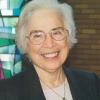
(Unsplash/JK Sloan)
"Boy, you hit that one out of the ballpark." So remarked the chair of the Community Life Committee at the retirement community where I now reside. I had just explained to an overflowing auditorium the relevance of the ancient Jewish practice of leaving an ethical will (now referred to as a wisdom will) for posterity.
A world where COVID made it impossible for grandparents to hug their loved ones; a world where values like greed and "elastic" truth makes meaningful, intelligent, and enduring decisions almost impossible; a world where the precious value of life is not respected — this is a world crying out for the wisdom and values that need to be the legacy we women and men religious, as well as aging continuing care residents, leave to that world.
The ethical will is an ancient Jewish practice that has become more widespread recently. We can find many articles about it on the web. In ancient times, the ethical will was transmitted orally to offspring. Think of the story of Jacob and Esau. And the many patriarchs who passed on their values and wisdom to future generations. My own father asked that I invite my mother and each of my siblings to his bedside when he was dying; alone with each, he told them that he loved them, and then shared a specific piece of wisdom with each of six children.
Actually, many people leave three wills:
- A living will, often called health care directives or advance care plans, which directs the medical profession and our loved ones to follow our wishes for treatment during our critical illnesses.
- A legal will, which records the ways we wish to dispose of our valuables — typically our material possessions.
- An ethical will (wisdom will), though not binding like the legal will, passes to the generations to follow our values. We bequeath to loved ones who we are and what we stand for.
We have many options for passing on our values and wisdom:
- A written document, like an autobiography.
- A letter or series of letters.
- A small booklet of vignettes (stories or slices of life).
- A video.
- A photojournalistic document.
- A thumb drive full of material.
Advertisement
So why is leaving an ethical will of any importance for women and men religious?
Religious congregations make great efforts to pass on their charism, mission and values to a world that so needs witnesses to those values. Through media and other formats, we can bequeath to future generations our stories of individuals and communities who have lived those values for decades and centuries.
The written document — autobiography, letter, book of vignettes — can have lasting value. To practice what I preach, I did write a series of vignettes in a book published on Amazon (apologies to those who boycott Amazon, but I cannot afford other publishers). My book is Audacity to Live: Memories of a "Why Not" Woman (2023).
In our congregation, we share Zoom virtual memorials to celebrate the life of a sister who dies. Not only do we learn more about our sisters who have served at missions throughout the world, but we also share our stories and values with those who will follow us. This memorial is a one-hour Zoom call with opening and closing prayers, time for one- to three-minute personal reflections by family and community members, a video of her life beginning with childhood, 10-minute break-out sessions for groups of four or five to share their personal experiences with the deceased sister. These celebrations are videotaped to make them possible to be accessed by anyone in the future.
The heritage of Jesus — the Way, the Truth and the Life — has been passed on through his stories: the stories of his life in the Gospels, his words to his disciples, parables he told, sermons like the Sermon on the Mount. Jesus' Way is the Way women and men have chosen to live, for centuries. It is the way we of the 21st century can pass on our legacy to posterity through leaving our Ethical (Wisdom) wills. These are the stories about who we are and about the charism, values and wisdom we want to leave the world.







